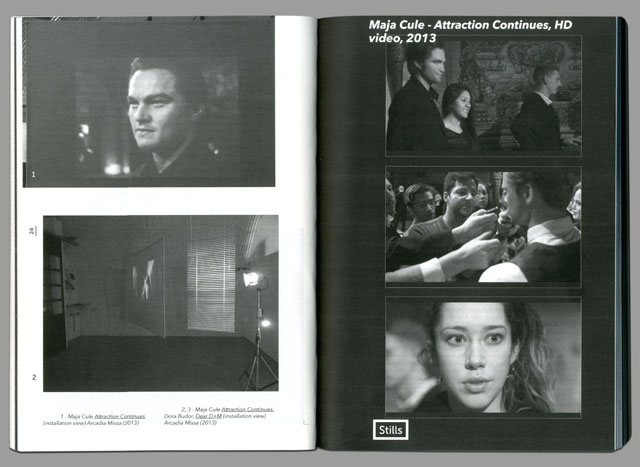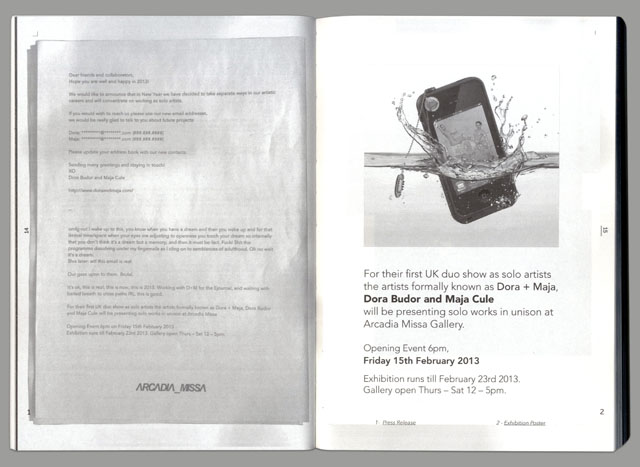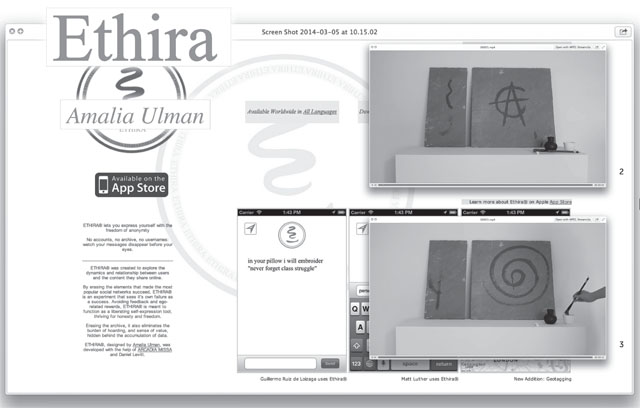“(ò_óˇ)” marks an appropriate end to the strain of excess that (networked) EVERY WHISPER IS A CRASH ON MY EARS embodies. Stamped on the empty last page of the anthology published by London’s Arcadia Missa and featuring contributions by 45 artists from around the (digitised) world, it tracks a six-month exhibition programme of the same name and a surplus of extra material. Press releases, installation photos, film stills, essays, artist interviews, prose, poetry, emails; these are scattered across 300+ pages of information that eschews a single-channel stream of content in favour of the more realistic overload of its stated ‘networked’ culture. Snubbing any conventional compulsion towards a straight narrative, the publication opts to map the web of collective thought from a creative cluster bound by book and fibre optics.

Sometimes it feels like there’s too much. Presenting a complexity of ideas that crash and collide with, as much as they support and strengthen each other, (networked) performs its introductory challenge to “ideology’s racket on words” in anticipating, even encouraging a total collapse of any distinction between content and form. This is, after all, a print publication littered with hyperlinks –a Soundcloud for Megan Rooney’s ‘Feeling European’ (2013), a YouTube embed for Holly White’s ‘I’m on my bike because I’m looking for you’ (2013) –that a cursor can’t click on; orginally coloured video screenshots are framed and reprinted on paper in grayscale.
“This is the end of Publishing and books are dead and boring”, announces global trade book publisher Boyd (‘B’)’s daughter Alysa (‘A’), in Bunny Rogers and Jasper Spicero’s ‘Random House’. All grown up and confronting her dad-as-Old Establishment, ‘A’ illustrates the potential for a shift in power through a text that is almost but not quite a script, in a publication that is almost, but not quite, a book.
“# – scenes where there is an alternative” says the symbol legend of ‘Random House’ as ‘A’ contradicts herself in “#The End of Small Sanctuary” sub-heading: “What you’ve got to understand is you’ve got to open your eyes to my values, I think it’s unbelievable that you’re actually listening to us”. It’s a similar sense of bewilderment that Rózsa Farkas and Harry Burke share in a conversation –also called ‘The End of Small Sanctuary’ –that actively confuses any notion of individual authorship, while revealing the irony of an internet where “interactivity doesn’t empower the user, but instead traps them in plot”.

It’s a trap of windowless metal walls and marble as ‘B’ is harangued by an attorney (‘AT’) who insists on a “more effective response to change” in a new world order where “objects are fossils from the pre-history of the attention economy”, according to Maja Cule. Because while Eleanor Ivory Weber maintains “a clean corporate office is the image of unquestionable success” in ‘A Story for Corporate Cleaners’, William Kherbek’s nameless banker in ‘The Counterparties’ bares witness to failure as he watches his “chair with its coffee stains and miserable back wheel” being carried off with a dissolving financial sector.
“The future as realistically capitalist is no longer so convincing”, announces Farkas in an extract from ‘Immanence After Networks’ for Post Media Lab, as Amalia Ulman observes the gradual disintegration of the “technical middle class” in an interview with Cadence Kinsey. Guillermo Ruiz de Loizaga instead opts to embroider “never forget class struggle” in a pillow in his poem for the ETHIRA® gallery show and iPhone app commission. It’s a symbolic gesture as inconsequential as what Ulman calls the “obvious class war” of a “rye bread with seeds” urban middle.
life
bleak
money
So go the “possible rap lyrics” of Stephen Michael McDowell’s ‘poetry ebook titled ‘tao lin’’ contribution to the Random House exhibition’s publishing-house.me online initiative. It explores the “relation between narrative and affect” as Gabby Bess’s intimate one-sided exchange asks of the art hanging in the Gagosian, “why not put our poems there?”

Why not indeed, as the effectiveness of the word as both utilitarian and artistic communicative force used in oppression as well as disruption folds back on itself as Burke and Farkas at once point out its importance in the enforcement of ideology as “non-negotiable”, while “language, when used well, can always evade its own meaning.” Because when Dora Budor says the virtuosic artist can “creatively adapt to multiple situations”, she’s suggesting that although we do “operate within, not against” (according to Elvia Wilk) a dominant online culture, it’s in hacking her father’s Comment is Free account that Huw Lemmey’s schoolgirl protagonist in ‘#nodads’ seeks to slowly destroy him –from the inside. Sure, “dad had an opinion” but in the case of Lemmey’s novella excerpt, it doesn’t count as much as the “wave of powerful butt-focussed instant sex release” that turns the mob against the London authorities in anti-capitalist, anti-patriarchal revolution.
.rtfs, spreadsheets, and spam; Facebook, Twitter and iMingle; Macbooks, PCs and iPhones. These are all formats, tools and devices, elements of Jill Magid’s “mechanical weapon” to be used against an entire generation raised within an unjust organisational structure. Except that these are the artists, the queer interlocutors who’ve come to understand these constructions better than the people who constructed them. It’s here that (networked) EVERY WHISPER IS A CRASH ON MY EARS finds hope, in refusing authority, hijacking power and using it for their own illicit ends. “(I’m an optimist, gross)”. **
(networked) EVERY WHISPER IS A CRASH ON MY EARS, edited and published by Arcadia Missa, was launched alongside the In the Future We Will All Be Modern mini-exhibition, running September 26 to 30, 2014.
Header image: (networked) EVERY WHISPER IS A CRASH ON MY EARS, ed. Arcadia Missa. Courtesy the gallery.













